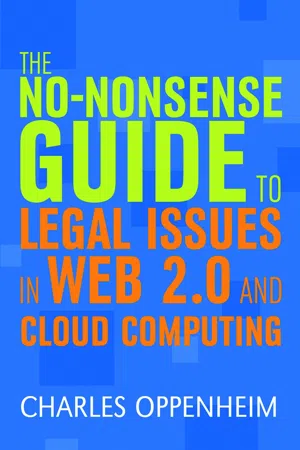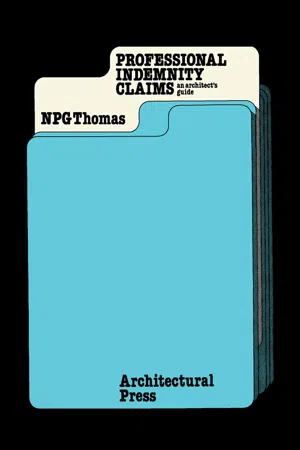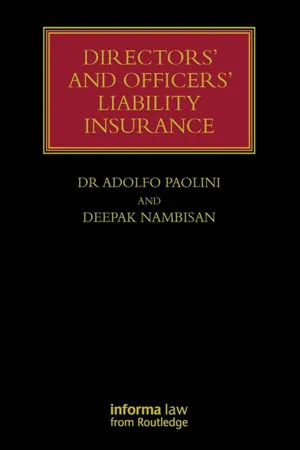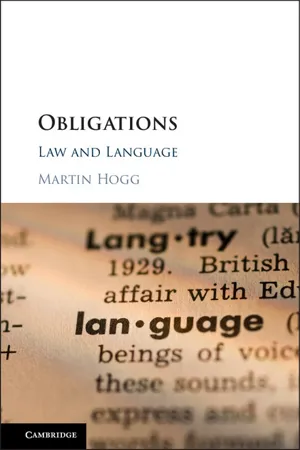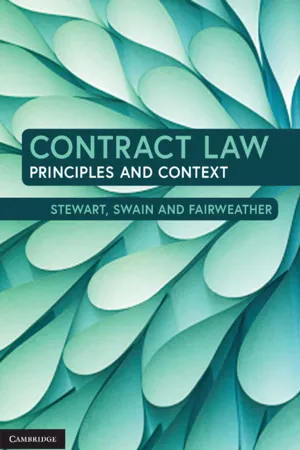Law
Contract Liability
Contract liability refers to the legal responsibility that arises from a breach of contract. When one party fails to fulfill their obligations as outlined in a contract, they may be held liable for any resulting damages or losses suffered by the other party. This liability is typically determined based on the terms and conditions specified in the contract.
Written by Perlego with AI-assistance
Related key terms
1 of 5
7 Key excerpts on "Contract Liability"
- Charles Oppenheim(Author)
- 2012(Publication Date)
- Facet Publishing(Publisher)
CHAPTER 8 Liability Introduction Liability can be broadly defined as a legal duty or obligation, or, slightly more specifically in the context of this book, the duty of care an individual or an organization owes to another. Failure in that duty means that the person who suffers as a consequence can sue the person or organization for the damage caused. It is important to note that the law of liability differs significantly between different countries. The focus of this chapter will be on UK law. In the UK, liability issues can arise both in contracts, and under the law of tort. This is not necessarily the case in other countries. Contracts The law of contract is complex and details of it are outside the scope of this book. Readers interested in studying this topic further are recommended to read a standard text on the topic, such as Paul Richards’ Law of Contract (10th edn, Pearson, 2011) or other texts as listed in Chapter 9. Readers should also note that the law of Scotland differs from that in England and Wales in some regards. In a nutshell, a contract is an agreement between two parties. Such an agreement can be verbal, as when one buys some fruit from a greengrocer, but the sorts of contracts that readers are likely to encounter in their professional lives, such as licences for the delivery of electronic resources, are in writing. They must involve an offer of something, for example, permission to access, display and download electronic resources, and an acceptance of that offer, typically indicated by the signing of the contract. Contracts do not have to involve money changing hands, though often they do. Any ‘consideration’ that is valuable to the other party is enough to make the contract legally secure, such as a promise to do something for the other party, or indeed, in some rare cases, a promise not to do something.- eBook - ePub
- Andrew Mitchell(Author)
- 2008(Publication Date)
- Routledge-Cavendish(Publisher)
15 Introduction to Contract Liability This topic enables you:- To appreciate the need for a law of contract.
- To draw a distinction between binding and non-binding agreements.
- To understand and explain the ingredients required for a valid contract (offer, acceptance, consideration and intention to create legal relations).
- To apply your knowledge of contract formation.
- To understand the meaning and consequences of a breach of contract.
WHAT IS THE LAW OF CONTRACT?
The law of contract exists to make sense of agreements, be they small or large, formal or informal, made over the counter or over the internet. Thus, the law of contract is relevant to us every time we go shopping and it is relevant to huge corporations that make multi-million dollar deals with each other. In addition, it identifies those agreements that the law will enforce and those that fall outside the legal framework. Concepts of ‘mutuality’, ‘exchange’, ‘promise’ and ‘bargain’ are central to an understanding of enforceable agreements. Those who enter into agreements do so for mutual benefit and on the basis of promises that will be fulfilled. Both parties hope to gain something of value, hence the idea of a bargain. The retailer who sells goods will hope to make a profit from the activity; the consumer who buys from that retailer is fulfilling a need or want and sees the value of the purchase. The goods are exchanged for a monetary price, with the parties’ intentions clear: they intend this to be a legally binding purchase, so that the retailer can record his sale of stock and the consumer can seek redress should there be a problem with the goods.The law of contract has developed over the centuries in the courts, with a framework that reflects experience in the light of changing commercial activities and practices. It is therefore a largely common law - eBook - PDF
Professional Indemnity Claims
An Architect's Guide
- N P G Thomas(Author)
- 2016(Publication Date)
- Architectural Press(Publisher)
5 The Concept of Liability Basis of liability Period of liability Limitation of liability Exclusion of liability This page intentionally left blank The Concept of Liability Basis of liability An architect may be sued either in contract or in tort. These are complicated topics which have merited the attention of a considerable number of learned authors and it is not the purpose of this book to do more than give a very general outline of their meaning before applying them to the particular case of an architect. Contract A contract is an agreement which can be enforced by law between persons, who may be legal persons How a contract is formed such as incorporated companies. Present-day society is such that people regularly enter into agreements with each other. Indeed, although people do not give any great thought to the legal effect of their everyday transactions, most of them, such as shopping or taking a train, give rise to legally binding agreements, which are in fact contracts. For an agreement to be a contract and thus enforceable at law it must comply with the following eight prerequisites. Certainty A contract is created by one party making an offer and another accepting it. There must be certainty as to what was in the minds of the offerer and of the accepter, and unless evidence to the contrary is produced, the law will presume that they were of one mind. If a contract document is signed and it is unambiguous the law will treat it as conclusive evidence of the terms of the agreement. Agreement It must have been agreed by the parties that they were legally bound to carry out the mutual obligations envisaged by the contract, as opposed to being morally bound alone. There must be evidence that this agreement exists, although in most cases oral evidence will suffice. 51 - eBook - ePub
- Adolfo Paolini, Deepak Nambisan(Authors)
- 2020(Publication Date)
- Informa Law from Routledge(Publisher)
In other words, anybody who causes damage is obliged to make that damage good. That obligation may arise from two different sources: first, as a result of a breach of contract (“contractual liability”); and secondly, as a result of a failure to comply with the general duty of care not to cause damage to third parties (the resulting liability being termed “delictual” or “quasidelictual”). 2 We consider those two sources in turn. II. CONTRACTUAL LIABILITY 7.04 Where a contractual relationship exists between the parties, one can ascertain the extent of the wrong and measure the damage thereby caused by assessing what the parties promised to each other and were, therefore, entitled to expect. In civil law a number of principles of contractual liability have developed as follows: (a) Good faith 7.05 Contracts must be executed in good faith. 3 This abstract concept, difficult to define with clarity, imposes upon the parties the duty to act fairly and reasonable in performing their contractual obligations, from the early stages and throughout the execution of the agreement. The duty, therefore, embraces the process of contract formation, seeking to ensure that anybody who has given their consent to enter into a contract, in so doing, has proceeded with absolute freedom and willingness and with knowledge of the subject-matter of the contract. The concept may have a further role to play in that there is “good faith” when due care is exercised while performing a contract - eBook - ePub
Construction Contracts
Law and Management
- Will Hughes, Ronan Champion, John Murdoch(Authors)
- 2015(Publication Date)
- Routledge(Publisher)
10 Liability in contract and tortWhere a contract has been properly made, in terms of the criteria laid out in the previous Chapter, it then becomes necessary to identify precisely what obligations it imposes on the parties – that is to say, what terms it includes. This is because where any party fails without lawful excuse to perform fully and exactly a contractual obligation, that party is guilty of a breach of contract. In considering this question, what emerges is that there are three types of contractual term: those express terms which are contained in the main contractual document itself; those (also express terms ) contained in other documents to which the main contract document refers; and those terms which are implied by law.In addition to those obligations created by a contract, a party may incur legal liability under the law of tort. The most important example of this type of liability is that based on negligence.10.1 EXPRESS TERMS
10.1.1 Terms and representations
Since English law does not as a general rule require a contract to be made in any particular form (see Section 9.2.6 ), it is in principle possible for the parties’ agreement to be spread over a number of documents, and even to include oral statements. Even where the parties have eventually signed a document described as ‘the contract’, it is open to a court to decide that this document does not paint a complete picture, and that the true contract consists of that document plus other terms. However, a court will not be quick to do this, for there is a presumption that a written document that appears to contain all the terms of a contract in fact does so.The result of these principles of contract law is the creation of some uncertainty regarding the status of a statement or promise made by one party to the other during the course of negotiations leading to the signing of a formal contract. Such a statement (which might be oral, or might equally be contained in, say, a letter) can be treated in law as a term of the contract. In this case, if it is untrue, the innocent party may bring an action for breach of contract. Alternatively, if it has operated as an inducement to the other party to enter into the contract, the statement may be treated as a misrepresentation, in which case the legal remedies available will depend on whether it was made fraudulently, negligently or innocently. This is not the place to discuss the remedies for misrepresentation, which will be found in any textbook on the law of contract. Suffice it to say that they are generally less beneficial to the innocent party than a right to sue for breach of contract. - eBook - PDF
Obligations
Law and Language
- Martin Hogg(Author)
- 2017(Publication Date)
- Cambridge University Press(Publisher)
There have been a number of judicial considerations of the relation- ship of the concept of ‘obligation’ to that of ‘liability’ (or of ‘debt’). These often occur in the context of legislative or contractual provisions in which the terms appear together. Such conjunctive usage is usually highly contextual, and it is considered separately below in Section G of this chapter. Generally, however, it may be said that, while sometimes such conjunctive usage indicates that obligation and liability are being con- ceived of synonymously, on other occasions courts have felt that the specific usage discloses an intended meaning of obligation as a source of a liability or debt, and thus as something anterior to such liability or debt. 89 This latter approach can be developed by saying, as it sometimes is, that ‘obligation’ relates to what a person ought to do because of a duty laid upon him and ‘liability’ to what a person must do because of a failure to perform such a duty. 90 The utility of a fundamental, basic meaning of a concept like obligation is that it should provide an anchor for the process of contextual, purpo- sive interpretation, certainly in the case of statutory interpretation. While contracting parties have, in the minds of some courts, been able to construct their own private dictionaries in which the use of a word might signify a meaning which is the opposite of, or vastly different 88 [1995] 1 AC 262, at 271. - eBook - PDF
Contract Law
Principles and Context
- Andrew Stewart, Warren Swain, Karen Fairweather(Authors)
- 2019(Publication Date)
- Cambridge University Press(Publisher)
Tort liability, in contrast, is seen as something that is imposed by the law rather than by the parties. But the two bodies of law are not as distinct as this may suggest. Tort and contract enjoy a close relationship. As noted at 1.10, the law of contract developed in part through the actions of trespass and trespass on the case, which we would now see as actions in tort. There is even a long established tort of inducing a breach of contract. 72 Once it was accepted that it was possible to sue in the tort of negligence to recover ‘pure economic loss’ (that is, financial loss unconnected to physical injuries or property damage), the boundary between contract and tort became more fluid. In the same way that damages for breach of contract reflect economic losses flowing from the breach, as discussed in Chapter 23, so damages in negligence might be awarded for economic losses flowing from the breach of a duty of care. 73 These developments have opened the way for concurrent liability when the same facts might potentially give rise to a claim in both contract and tort. Australian law does not generally prevent a plaintiff from having or making that choice: see Astley v Austrust (1999), noted in 23.19. Concurrent liability will, for example, occur where there is a negligent or deceitful misstatement which is incorporated as a term of a contract: see 18.03. Tort law has also been used to fill gaps in situations which are close to a contract, but where a key element of contractual liability is missing: see eg Hill v Van Erp (1997), discussed in 8.15. But despite the artificiality of distinguishing between contract and tort (or equity, or property, or restitution, etc), there are practical reasons for continuing to do just that. The sheer volume of the rules and principles that govern all these areas make them difficult to cover in a single book, or to teach or study in a single course, other than at a very general level.
Index pages curate the most relevant extracts from our library of academic textbooks. They’ve been created using an in-house natural language model (NLM), each adding context and meaning to key research topics.
